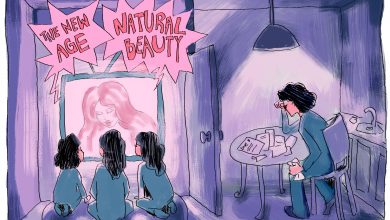The Commodification of Makeup

Image courtesy of Glossier via Youtube
In the last few years, makeup has saturated popular culture and begun to spark debate, especially in terms of its relationship to feminism. Feminism entails the critical analysis of our choices, and recognition of the social conditions of our interests and actions. The argument that wearing makeup is anti-feminist has lost traction as third wave feminism renounces demonizing what societal gender expectations dictate as feminine.
On one hand, makeup is one of the few art forms historically dominated by women, and I do appreciate its versatility and personal variety. But at its core, makeup constitutes an enormous industry fueled by patriarchal manipulation and capitalistic greed.
As an eighteen year old, I don’t feel as much of an obligation to cover and change my self-perceived flaws, but that doesn’t mean that I don’t rely on makeup to mitigate my many insecurities. From my skin to my flat nose to my lack of cheekbones, I have been insecure about my appearance since at least middle school — a time when I definitely did not need to wear makeup. But so many of my peers wore it, making me feel pressured to both conform and look and act more “adult” or more “desirable.”
However, I cannot imagine the magnitude of this pressure young girls face now, constantly surrounded by Instagram models and YouTube beauty gurus who preach — on a daily basis — new, unnecessary products that cost hundreds of dollars under the guise of feminist rhetoric. Social media allows people to curate posts that form a desirable online identity showcasing their lives and looks, and this distortion can be damaging to our self-perception. When we are surrounded by envy-inducing images of all the people we follow, it becomes much easier to compare ourselves to others — to wish to look as great as someone does in a carefully selected and posed photograph. As this desire and constant comparison continues, we begin to frame our lives around how it will be documented in our feed, blurring the distinction between our individual and online identity.
The rise of social media networks has produced a new kind of fame, socially elevating people who have thousands or millions of followers but who are probably not household names or easily recognized by strangers. Since “influencers” and “creators” base their livelihood on sharing their lives publicly, there appears to be a heightened sense of intimacy between followers and influencers (they literally are just like us!). However, many digital influencers capitalize off their seemingly normal posts, and can make thousands of dollars off one picture of them painting their nails or playing with their dog. Companies are well-aware that consumers now relate much better to other consumers rather than blatant advertisements, and have adapted to a new form of subtle, pervasive marketing.
Many corporations now hire “influencers” to market and sell their products. All influencers need to do is post about their product or even just tag the company’s public account in a picture, and the company will reach an audience comprised of thousands. These products are then associated with the glamorous beauty and lives of the influencers. The most common examples are “Fit Tea,” a detox powder that is promoted by the Kardashians and many other Instagram celebrities, or Glossier, a beauty brand that connotes an effortless, “natural” beauty. This form of marketing through social media may be a new concept adapted to modern communication, but the capitalist exploitation dictating how people should conform their appearances and bodies to resemble celebrities and certain unattainable ideals is not new.
Many women claim that they choose to wear makeup because it’s empowering and gives them confidence. However, this view aligns with the ideals of choice feminism and ignores the institutional oppression that governs makeup throughout history. If the decision to wear makeup is truly just an individual form of expression, there should not be social repercussions for choosing not to wear makeup. But there are, and they are extreme.
Look at the comments on any pictures of celebrities who aren’t wearing makeup, and you’ll see both men and women sneering at how ugly her bare face is, or arguing that she must be at least wearing foundation and concealer. Pictures posted by makeup amateurs and aspiring artists are flooded with comments from strangers criticizing the wing of their eyeliner, or their lack of blending.
First, we claim that makeup is just the wearer’s choice, and then we shame others for choosing not to alter their appearance? We continue to perpetuate ridiculous beauty standards as we mock those attempting to conform with an expensive skill instead of recognizing and criticizing the structures that pressure us to comply with these norms.
In addition to these manipulative selling strategies, makeup remains a mechanism that perpetuates racism. For instance, mainstream beauty ideals are based on Eurocentric features. One of the most common beauty trends is contouring, the practice of applying darker and lighter products to areas of one’s facial structures to enhance certain features. Using these techniques, people are able to carve out new, high cheekbones, shrink their foreheads, and slim their noses to resemble more angular shapes that are seen most commonly on European faces.
The racism behind the beauty industry also translates into the types of cosmetics that are produced. Despite the infinite, constant array of new brands and products, there is a very limited range of skin products designed for women of color. The majority of foundation brands, both high-end and drugstore, offer a wide range of fair and medium shades, complete with different undertones, yet no more than a handful of selections for dark skin tones. This disparity in availability reflects a lack of diversity in beauty creators and company executives, and a larger exclusion of women of color in societal beauty standards. The makeup industry is centered around white beauty standards that causes people to buy into white consumerism — consumerism supporting the same capitalist complex that seeks to erase the non-white features and bodies that it deems unfit for existence.
The flashiness of beauty marketing distracts from the exorbitant ugliness of the industry. There are definite changes in beauty ideals and trends over time, from the lip gloss of the 2000s to the carefully-sculpted eyebrows of 2016. But these ideals are still marketed the same way today as they were in the past — through hyper-exposure via media that builds on celebrities’ social capital and curated public appearances. The cosmetic industry feeds off the notion that consumers will never be able to catch up to their level of beauty, but they will purchase whatever they can to try.
I will likely continue to purchase and wear makeup, and I definitely believe people should not be condemned for choosing to appear “traditionally feminine.” However, we need to recognize that the industry is driven by capitalist manipulation of individual consumers through cultural standards that preserve racism and misogyny.




